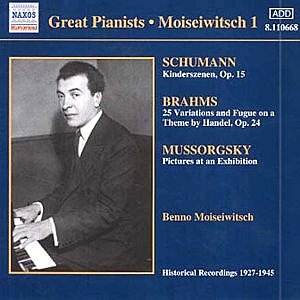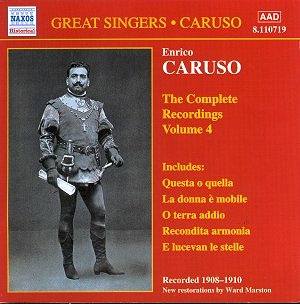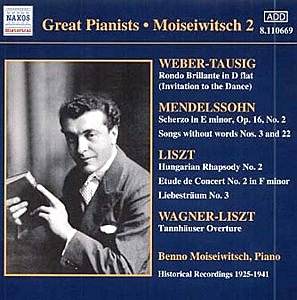 Composer: Moiseiwitsch
Composer: Moiseiwitsch
Works: Volume 1 Naxos [CH]: Great Pianists: Moiseiwitsch Vol 1
Performers: Benno Moiseiwitsch (pianoforte)
Recording: 14.4.1930, Queen’s Small Hall (Schumann, Brahms); 4.3.1930, Abbey Road Studio 3 (Mussorgsky)
Label: NAXOS Historical 8.110668
In this first volume of Benno Moiseiwitsch’s recorded legacy, we are presented with a remarkable exploration of the Romantic repertoire through the lens of a pianist whose artistry may have faded from mainstream consciousness but whose interpretative insights remain strikingly relevant. The collection spans works by Schumann, Brahms, and Mussorgsky, each reflecting distinct facets of the composer’s temperament and stylistic inclinations.
Schumann’s Kinderszenen, op. 15 opens the disc with a delicate touch and a nuanced understanding of innocence and nostalgia. Moiseiwitsch’s approach is neither overly sentimental nor excessively dramatic; rather, he strikes an admirable balance that allows for the subtleties of Schumann’s miniatures to emerge with clarity. In pieces such as “Von fremden Ländern und Menschen,” his phrasing encapsulates a childlike wonderment, while the more introspective “Träumerei” benefits from his limpid expressiveness. The recorded sound, though inherently limited by the technology of 1930, allows the listener to appreciate the tonal richness and dynamic shading that Moiseiwitsch brings, even as the piano’s timbre occasionally reveals a brittle quality.
Transitioning to Brahms, the Variations and Fugue on a Theme by Handel, op. 24 stands out as a testament to Moiseiwitsch’s formidable command of the keyboard. His interpretative choices in the first variation, with its buoyant lightness, contrast sharply against the more somber nature of later variations. Notably, Moiseiwitsch exhibits an exceptional ability to maintain clarity amidst Brahms’s intricate counterpoint, particularly in the variations that demand both technical dexterity and emotional depth. Here, the listener may recall the interpretations of other notable pianists, such as Artur Schnabel, who, while offering a more vigorous approach, often forsake the lyrical fluidity that Moiseiwitsch so adeptly navigates.
Equally captivating is the Intermezzo in C, op. 119/3, where Moiseiwitsch’s phrasing unfurls like the petals of a flower, each note imbued with a sense of yearning. His ability to sustain melodic lines without undue pressure is commendable, creating an atmosphere of introspection that feels both personal and universal. The Rhapsody in E-flat, recorded earlier in 1928, showcases Moiseiwitsch’s flair for the dramatic; the contrasts between the lyrical and the tempestuous are articulated with a keen sense of structural integrity.
The disc culminates with Mussorgsky’s Pictures at an Exhibition, recorded in 1945, where Moiseiwitsch’s interpretative prowess is on full display. His reading of “The Great Gate of Kiev” is particularly notable for its grandiosity and majesty, imbued with a palpable sense of culmination and triumph. Moiseiwitsch’s ability to propel the music forward while maintaining a robust sense of rhythm and pulse is commendable, and it resonates with the collective spirit of the work. Here, one cannot help but draw comparisons with the electrifying interpretations by Vladimir Horowitz, whose more flamboyant style often overshadows the nuanced approach taken by Moiseiwitsch.
The engineering of this collection, while reflective of its era, is sufficiently clear to allow the listener to engage deeply with the music. The acoustic environment of the Queen’s Small Hall imparts a warmth to the recordings that complements Moiseiwitsch’s interpretative warmth, even if the Abbey Road recording of Mussorgsky lacks some of the immediacy found in contemporary recordings.
In conclusion, this Naxos historical release serves as a valuable reminder of Benno Moiseiwitsch’s significant contributions to the piano repertoire. His interpretations offer a compelling blend of emotional depth and technical finesse, grounded in a profound understanding of the Romantic idiom. While the historical context of these recordings may impose certain limitations, they are nonetheless imbued with an artistic integrity that resonates with audiences today. This volume not only honors Moiseiwitsch’s legacy but also enriches our understanding of the works he so passionately interpreted.

